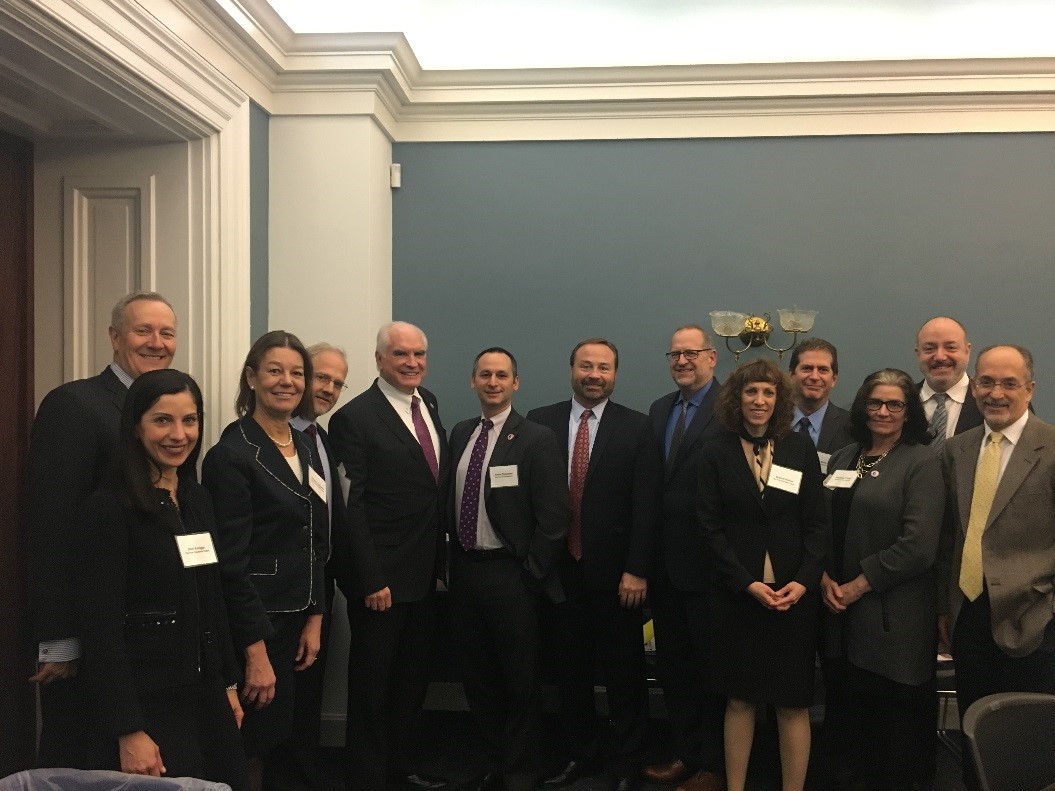Washington Snapshot - March 9, 2017
In this Week’s Edition of Snapshot…
- Council and other foundation leaders meet with Members of Congress
- Tax Reform Update: Bill to repeal ACA is introduced, tax reform to follow
- The Council files amicus briefs in recent legal cases
- In the States: California Speaker establishes select committee on the nonprofit sector
 News from the Hill
News from the Hill
Council Meets with Tax-Writing Members of Congress
Today, Council leadership and a number of foundation leaders met with members of the House Ways and Means and Senate Finance Committees. During these meetings, we discussed tax reform and our perspectives on how a number of the provisions would impact our work in the philanthropic sector.
Specifically, we raised the importance of preserving the full scope and value of the charitable deduction, the benefit of foundation endowments, and the expansion of the IRA charitable rollover to include donor advised funds.

Pictured above: Leaders from the Heinz Foundation, Hewlett Foundation, Delaware Community Foundation, Walton Family Foundation, Council on Foundations, United Way Worldwide, and The Pew Charitable Trusts with U.S. Representative Mike Kelly.
So, What’s Up with Tax Reform?
In the coming months, we will provide weekly updates with new developments in the tax reform process.
This week, House Republicans released the text of legislation that will “repeal and replace” the Affordable Care Act (often referred to as the “ACA” or “Obamacare”). Upon its release, the bill was met with both praise and criticism.
In the House, members of the conservative Freedom Caucus and Republican Study Committee voiced opposition to the bill, stating that it does not go far enough to repeal what was established under the ACA. In the Senate, four GOP Senators wrote in a letter to Majority Leader Mitch McConnell (R-KY) that they would “not support a plan that does not include stability for Medicaid expansion populations or flexibility for states.” Democrats in both the House and Senate oppose the bill, and plan to air their concerns throughout the legislative process.
Despite this swell of discontent, the bill was marked up yesterday by both the House Ways and Means and the Energy and Commerce Committees (the committees with jurisdiction over this legislation). Not concluding until 4:16 a.m. ET this morning, the four subsections of the bill that were approved by the Ways and Means Committee will now move to the House Budget Committee, where they will be combined with the legislation that was marked up by the Energy and Commerce Committee. The House Budget Committee may mark up the combination of the two bills next week.
As we’ve noted in previous weeks, the progression of this healthcare legislation is a key factor in the timing of comprehensive tax reform — as the House intends to take up legislation for tax reform upon passing the healthcare bill and sending it to the Senate.
 Trending in Legal Affairs
Trending in Legal Affairs
Council Files Amicus Briefs in Two Recent Cases
The Council on Foundations has recently filed two amicus briefs in legal cases that involved issues that could significantly impact our members and the field.
The first brief was filed late last year in the case of The Official Committee of Unsecured Creditors v. the Archdiocese of St. Paul and Minneapolis, et al. In this case, a federal bankruptcy court denied the request of a group of unsecured creditors to substantively consolidate the assets of 187 separate charitable entities — including schools and churches — with the debtor in the bankruptcy case. The court found that forcing charitable, non-debtor entities into the bankruptcy process without their consent was inconsistent with Section 303(a) of the Bankruptcy Code, which prohibits the commencement of involuntary bankruptcy cases against a corporation that is not a moneyed business or a commercial corporation.
The second of these briefs was jointly filed with Alliance for Justice in the case of Parks Foundation v. Commissioner of Internal Revenue. This case raised questions around the Internal Revenue Code’s application of lobbying rules to private foundations and other charitable organizations. If the Tax Court’s decision were to stand, both private foundations and public charities would face great restrictions on their policy-influencing activities, particularly in the ballot measure context.
If you have questions on either of these cases, please contact our legal team at: legal@cof.org.
 Happening in the States
Happening in the States
Exclusive from our colleagues at the National Council of Nonprofits.
California Speaker Establishes Select Committee on the Nonprofit Sector
The California Assembly is taking a major step in recognizing the contributions and impact of philanthropy and charitable nonprofits in the state, as evidenced in the announcement by Speaker Anthony Rendon of the creation of the Select Committee on the Nonprofit Sector. The Select Committee, to be led by Assembly member Monique Limón of Santa Barbara, will provide a structure for developing and implementing more effective collaborations between California’s elected officials, government agencies, philanthropic leaders, and nonprofit organizations. According to the California Association of Nonprofits (CalNonprofits), it is designed to help create new strategies, innovative policies, and meaningful programs to improve the economic and social well-being of millions of Californians.
The state association’s CEO, Jan Masaoka, heralded the announcement of the Select Committee: “Our state’s nonprofit and philanthropic sectors not only represent the dreams and aspirations of California's varied communities, they are robust with human capital, financial capacity, and innovative potential.” She stated further: “Government, nonprofits, and philanthropy working together can identify and advance partnerships and solutions that will benefit all Californians.” Joining in the advocacy efforts for the Select Committee are the League of California Community Foundations and Southern California Grantmakers.
